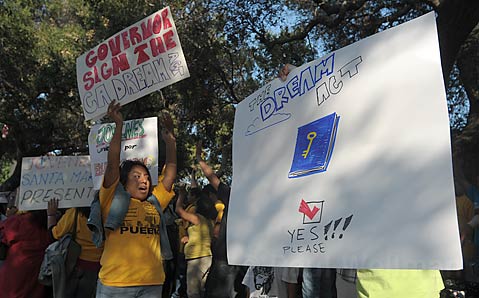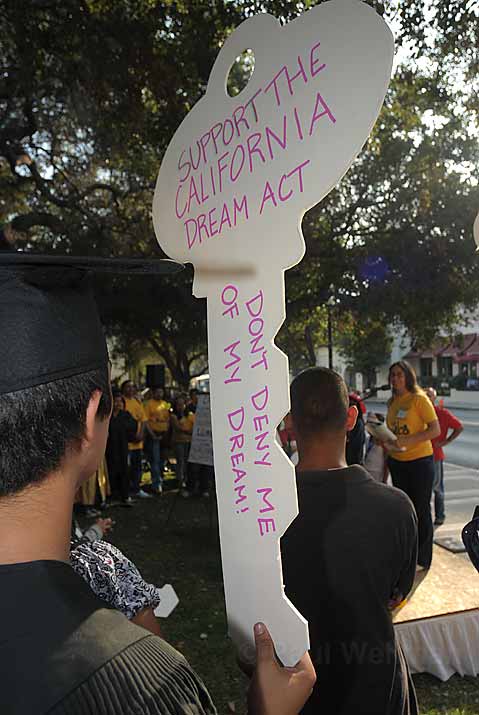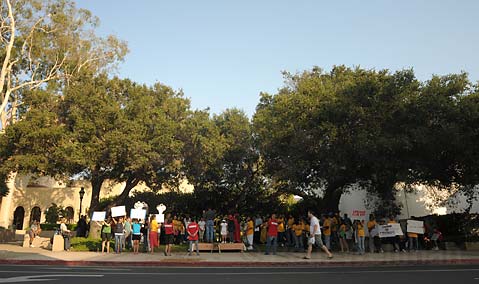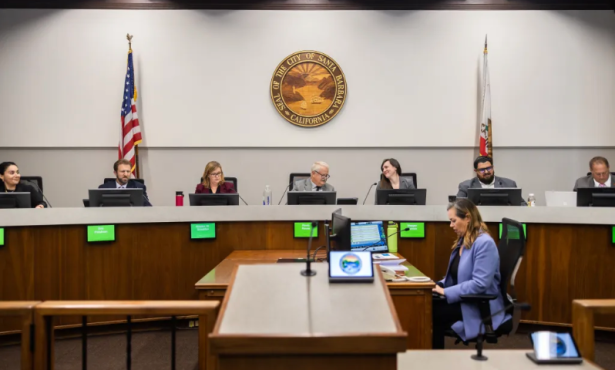PUEBLO’s Pen Poised to Promote Dream Act
Supporters Rally for Financial Aid for Undocumented Students

A small but boisterous crowd of young men and women dressed in caps and gowns gathered in front of the public library Friday afternoon. They were not celebrating their graduation but instead symbolizing the estimated 25,000 undocumented students who struggle to achieve their hopes of higher education because of high costs coupled with a lack of financial aid.
The students were part of a rally organized by PUEBLO, in conjunction with various community groups such as CLUE (Clergy and Laity United for Economic Justice), in support of the California Dream Act, or SB 1301, which would allow undocumented students to apply for financial aid from public colleges and universities.

Included in the rally was a five-foot-long pen that has traveled from Chula Vista and is destined for the governor’s office after several stops throughout the state as part of a string of similar rallies.
The bill has previously passed the State Assembly and Senate but has been vetoed by Governor Arnold Schwarzenegger before. Belen Seara, director of PUEBLO, estimates the bill will reach Schwarzenegger’s desk sometime around the end of this month. Seara said to the gathered crowd, “If the governor vetoes this bill again, he will be putting in the shadows thousands of California’s youth.”
“The Dream Act is not a charity cause,” said Laura Flores, a UCSB student. “It’s about equality, investing in our dreams, and ultimately it’s about investing in California’s future.” Flores told the crowd how she had to take a quarter off from college to work two jobs in order to be able to afford her tuition, but underlined that her circumstances were not unique.

The Dream Act would require undocumented students to have attended at least three years of high school in California, either graduated or received their GED, and sign an affidavit stating that they will apply for permanent residence. These are the same requirements for AB 540, passed in 1991, which allows undocumented students to pay in-state tuition at public colleges. While the previous bill makes education more affordable for students, the Dream Act would increase the number of undocumented students who could attend California’s universities, as many students’ legal status also prevents them from working.
“Through the Dream Act, I and others like me will be able to break stereotypes of immigrants being a burden on this country,” said Tomas, a 16-year-old Santa Barbara High student, adding, “I’m not just doing it for me, but for my community too.”
The bill is not without its detractors, many of whom characterize it as too lenient to people whom they perceive as lacking the right to be in the United States and to benefit from services that citizens enjoy. First District Supervisor Salud Carbajal called the opposition “xenophobia at its worst” and bemoaned that “a basic right of education has become a bargaining chip.”
UCSB professor of Chicano studies Ralph Armbruster-Sandoval went a step further and called opposition to AB 1301 racist, saying, “Why do people want to stop them from achieving their dreams? Because they want things to stay the way they are.” Armbruster-Sandoval added that by limiting the education of the undocumented population, California is creating a perpetually impoverished class of unskilled labor.

Californians for Population Stabilization opposes the bill, alleging that it would take funding from Americans. Eric Guerra, staff person from the office of State Senator Gilbert Cedillo, contends that the funds would not come from state or federal aid but instead give undocumented students a fair chance to compete for the student aid distributed by individual campuses. “We aren’t providing any guarantee of success. We are providing the opportunity for success.”
With the bill crossing the governor’s desk in the coming weeks, speculation is high that another veto is in the cards. Many at the rally remained hopeful, however. As Annette Cordero, Santa Barbara School Board member and SBCC English instructor, saw it, supporting the education of California’s youth regardless of their legal status will be a benefit to all California. “If we don’t support them, we’re the ones who are going to pay the price,” she said.



